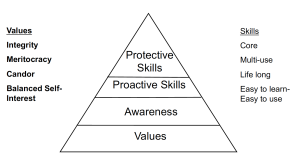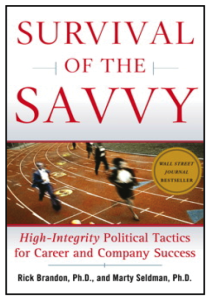What is Organizational Savvy? Why is it an Essential Leadership and Life Skill?

Organizational Savvy (OS) is a concept you will encounter in discussions about important career skills. Rarely is it clearly defined and therefore it can be hard to distinguish from “street smarts”, emotional intelligence, social IQ, political savvy, or navigating corporate dynamics.
Of course, I can’t provide THE definition of Org Savvy but today I want to describe an Org Savvy model that I’ve used for the past 25 years. This is a robust model that includes guidance about career advancement, influence and persuasion as well as protecting your company’s resources and reputation.
My goals are to describe the core values and competencies that comprise OS and explain why it is such a crucial skill set for leadership effectiveness and going as far as you deserve in your career. The model came together for me when I read Kelly Reineke’s research on power and communication and connected it to patterns I was seeing in my executive coaching engagements. Later Rick Brandon and I expanded it with seminars, assessments and books.
Organizational Savvy Model
- Definition
- Core Applications
- Key Skills/Practices/Competencies

1. Definition – A set of skills and strategies that combine personal integrity with an astuteness about corporate politics and human nature.
- Personal Integrity – This is an essential part of our definition and overall approach. Whatever moral compass or set of values you have before you become savvy you will retain after you acquire savvy.
- Astute – To become savvy you don’t have to become political but you do have to develop awareness and knowledge about power, perception, deception, self-interest, sabotage, and more.
- Reality – As I will detail below, a savvy leader accrues many advantages, but it starts with seeing Reality. The reality of the organization (power dynamics, networks, alliances, agendas, the real “scorecard”, etc.) and the reality of who you are dealing with and how they operate. Not only do savvy leaders learn to read the signs and signals, but they see these realities sooner rather than later; this allows them to “see it coming” and even predict behavior.
- Proactive and Protective – Some of the savvy skills and strategies are proactive actions to increase the odds that your company makes a fully informed decision about your talent, contribution and potential. This includes understanding how power, perception, “buzz”, “scorecard”, networking, and self-promotion impact decisions about rewards, recognition and increased responsibilities. Some of the core competencies are necessary to protect you, your team, and the company.
2. Core Applications
- Supporting the “Meritocracy” Folks
- Blocking Overly Political People
Supporting Meritocracy Folks
Even if you never heard this word growing up, the people around you who encouraged you to work hard, educate yourself and develop skills, believed in “Meritocracy.” Rewards, recognition, and power should be vested in people with ability and results. Advancement should be based on measured achievements. Your ideas and effort should matter, not your ethnicity, accent, gender, skin color, gender identity, or percentage of body fat. Embracing this set of values is rewarded in most companies and early in their careers Meritocracy folks do well. Often, after they advance to a certain level, their blind-spots about politics and in particular overly political people, create significant disadvantages and vulnerabilities. The Savvy Model is designed to equip them with an essential awareness and key skills to add to the Meritocracy value set; to move their careers forward and get their best ideas implemented.
Blocking Overly Political People
The material and psychological rewards of success in corporate life are high so it’s not surprising that it can attract ambitious, competitive people. So we should expect reasonable displays of self-interest and “biased social accounting” from our colleagues. Overly political people (OPP) go way beyond this “normal” range of behavior. They are defined by 2 characteristics.
A. Extreme Self-Interest – Their interests are “numero uno.” OPP will not only put their interest over the team’s goals, they may prioritize them over the company’s objectives and reputation, and sometimes over the interests of consumers.
B. “What Can I Get Away With?” – They don’t view situations in terms of what is right, fair or earned. They scan their environment through the lens of “what can I get away with?” So if they can take credit, assign blame, make excuses, hide or distort information, sabotage, marginalize, intimidate, tarnish reputations, flatter/ “manage up”, etc. with little risk or consequence they will do it. Therefore, OPP pose substantial risks to you, and the company’s resources and reputation. They often drive leaders with good values out of the organization. Please don’t underestimate your OP colleagues. Their behavior may be obvious to you but if they disguise it with people in power they can stay around long enough to do a lot of harm. Of course, there are degrees of OPP but in general the more power they get and the longer they stay, the more damage they will do to the organization. The Organizational Savvy Model is designed to expose this behavior and equip people with the right values, competencies, and intentions to deal with OPP effectively.
3. Key Skills/Practices/Competencies
Early in my coaching career I encountered a steady stream of people with good values, skills, and even results. They often came to coaching after they had been passed over, underestimated in the organization, or undermined by a colleague. When we would discuss some of the realities of what happened I would hear comments like:
“I hate politics”
“What goes around comes around”
“If that’s what it takes to get ahead, count me out”
“Marty, if you are going to teach me to be political this is not going to work”
This is what propelled me to develop the OS Model. Then I was able to reply: “I’m not going to coach you to be like political people but I am going to teach you to be as astute as they are about power, perception deception, etc. And I promise you that all the savvy skills and strategies can be done with integrity.”
So while I can’t discuss all the competencies in depth in a short article, I do want to give you a clear answer to “what does an organizationally savvy leader do at work that a pure “meritocracy” person might not do?”
- Studies Power – To understand how power works in general and to become aware of the specific power dynamics in your organization is not just useful, it’s essential. This knowledge, in and of itself, will not make you “power hungry” or lead you to abuse power.
- Detects Deception – To be savvy is to have a good BS detector about people and their agenda.
- Reads “Tells” – Just like a professional poker player will gather massively more information in a two-hour game, a savvy leader will pick up 2-5 times as much information in a 2-hour meeting. They accurately read signs and signals about levels of interest, sincerity hidden agenda, power differences, allies and adversaries, etc. Also, since “people will tell you how to sell them,” this skill increases your effectiveness at getting people to buy into your best ideas.
- Leverages Their Network – “The day you need a network it’s too late to build it.” Not only do savvy people build and maintain networks, they know 11 ways to leverage these networks to get the recognition they deserve, sell their ideas, and protect their reputations.
- Creates an Accurate Perception of Their Talent, Contribution and Potential – “The difference between reality and perception is that people make decisions based on perception.” Savvy people find out how they are perceived (the buzz) and work on things that need to be improved (reality) and create a plan to change erroneous perceptions.
- Effectively Self-Promotes – Most people want to be seen as a team player and not as braggarts who exaggerate their contributions. However, the savvy person knows that just letting the results speak for themselves can lead to being underestimated or worse, make it easier for someone to take credit for your work. Therefore, they develop a communication plan to put their “handprint” on their work, without it feeling like bragging or the message being perceived as bragging.
- Focuses on the “Real Scorecard” – The Leadership Scorecard: How do the people in power, the real people who make decisions about your career, define leadership? What are the core values and key competencies they look for in leaders they will elevate? What are the “knockout” factors that eliminate you from consideration for getting more responsibility? This is the most important scorecard to be aware of. The key connection to make is that this leadership scorecard directly translates to people decisions. The reason you need savvy to discern this, is that the “scorecard” is not always what is represented in the laminated cards, vision statements or speeches.
- Enhances Executive Presence and Impact – “We convince by our presence” – Walt Whitman. The savvy person knows, even if it is not always fair, that executive presence is a factor in who gets promoted and who doesn’t. Therefore, they regularly get feedback about their presence and impact.
- Challenges Ideas and Addresses Difficult Issues in a Respectful Manner Without Embarrassing Others – Savvy leaders have a good sense of timing an awareness of the situation and a collaborative vocabulary that allows them to calibrate their message.
- Protects Themselves and Their Teams from Sabotage and Marginalization – Being savvy includes being astute about the types of sabotage and marginalization you are likely to encounter (they “see it coming”), as well as being equipped with skills to protect yourself and sometimes the organization.
- Practices “Healthy Selfishness” – Being savvy includes the skills of saying no, setting boundaries and doing enough self-care to set yourself up for success.
So, to wrap things up, I hope the advantages of becoming savvy are now clear, and also that these skills and strategies can be coupled with fairness and good intentions. The ultimate goal of a savvy leader is to actually move the culture to be less political and more of a meritocracy where people with the right values and competencies are recognized and rewarded.
Additional Resources
Books
Brandon, R., & Seldman, M. (2004): Survival of the Savvy: High Integrity Political Tactics for Career and Company Success. New York, NY: Free Press

Bauer, M., Seldman, M., Santilli, P., & Thomas-Williams, J. (2022): A Woman’s Guide to Power, Presence and Protection: 12 Rules for Gaining the Credit, Respect, and Responsibility You Deserve. Pembroke Pines, FL: Optimum Press

Articles found at www.optimumassociates.com/thought-leadership/
Fully Identify Your Strengths and Potentials
Reading Tells
Robust Self-Care
How to Avoid 8 Serious Career Risks (by managing stress)
Sharpening Your BS Detector
The Power of Self-Interest
Deciding Whether to Forgive or Forget?
Camera Check
Lessons in Organizational Savvy: Handling Sabotage
The Halo Effect
To Become More Authentic and Effective at Collaboration, Ask these 2 Questions…
Analyzing Success
